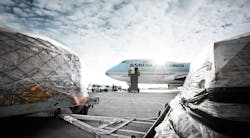With More than 40 Percent Cargo Growth, Korean Air Cargo Relies on Vienna Airport as Cargo Hub
Korean Air Cargo is recording rising freight figures at the airfreight hub Vienna Airport: In the pandemic years 2020 and 2021, tonnages increased by more than 40 percent, and the South Korean airline is also recording steadily rising growth rates on its route between Seoul-Incheon and Vienna in the first five months of 2022. Most notably for the automotive industry in Central and Eastern Europe, Korean Air Cargo handles freight at Vienna Airport, which it uses as a European logistics hub thanks to its geographically ideal location and excellent handling infrastructure. With the expectation of further increases in tonnages, Korean Air Cargo continues to hold on to Vienna Airport.
With approximately 39,400 tons in 2020 and 39,800 tons in 2021, Korean Air Cargo has significantly expanded its business at Vienna Airport over the past two years (27,700 tons in 2019). Also in the first five months of 2022, the South Korean airline has recorded steadily increasing growth rates. Korean Air Cargo has started connecting its homeland hub with Vienna Airport in 2004. At the beginning, the airline used Boeing 747-400F freighters. Since 2012, Boeing 747-8Fs and Boeing 777Fs have also joined the types deployed to Vienna. Meanwhile, Korean Air Cargo operates up to 13 flights per week to the Austrian capital. This makes it the airline's busiest airport in Europe as well as its main logistics hub for the continent. Korean Air Cargo has transported more than 535,400 tons of cargo to and from Vienna Airport.
In particular, Korean Air Cargo uses Vienna Airport to handle goods to and from Asia for automotive production in Central and Eastern Europe. Electronic and pharmaceutical goods also account for a significant share of tonnages. Thanks to its logistics infrastructure and handling capacities, Vienna International Airport offers fast transshipment to the European highway network. The geographically ideal location has enabled a comprehensive road feeder network, through which cargo can reach approximately 23 countries within 36 hours by truck.
"For the coming future, we strongly expect a further increase in tonnages demanded between Seoul-Incheon and Europe. The already good development at Vienna Airport proves that we have chosen an ideal airport and transshipment point for Central and Southeastern Europe for this purpose. Despite the Corona crisis and without any congestions or disruptions, we have been able to reliably achieve a high expansion of tonnages at Vienna Airport," says Park Joonseok, regional cargo manager Austria, Eastern Europe at Korean Air Cargo.
"Air freight is becoming increasingly important in the automotive, electronics and pharmaceutical sectors. The airspace closures over Russia or the congestion at the Chinese seaports increase the demand for reliable capacities, especially between Asia and Europe. We are therefore pleased to have Korean Air Cargo as a long-standing and strong partner with whom we can offer these capacities together thanks to our excellent logistics infrastructure and ideal location in Central and Eastern Europe," says Michael Zach, vice president sales and finance, Ground Handling & Cargo Operations at Vienna International Airport.





